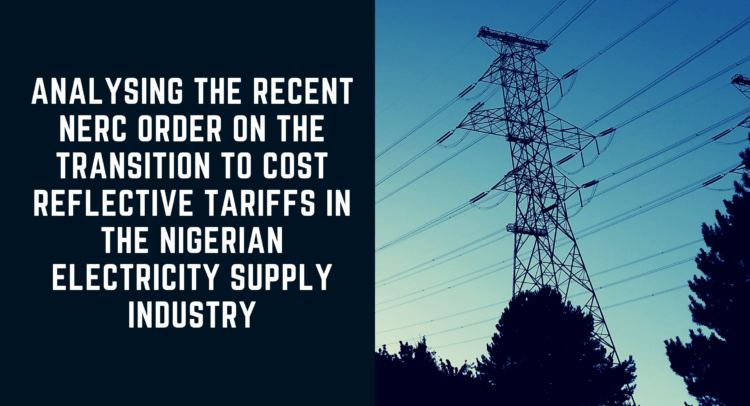Introduction and Context of the 2020 NERC Order on the Transition to Cost Reflective Tariffs in Nigerian Electricity Supply Industry (NESI)
On 31 March 2020, the Nigerian Electricity Regulatory Commission (NERC) issued an Order on the Transition to Cost Reflective Tariffs in the NESI. The Order recognised the application by power distribution companies (DisCos) for an upward review of end-user tariffs, as well as the application by the Transmission Company of Nigeria Plc (TCN) for an upward review of the rates payable to the Power Generation Companies (GenCos) that provide the Ancillary Service of Spinning Reserve.
In compliance with the regulatory requirements for instituting a tariff increase, NERC held public hearings in the different franchise areas of the respective DisCos. These hearings resulted in the following findings:
- end-users are willing to pay appropriate rates for electricity, dependent however, on the assurance by the DisCos of guaranteed hours of service, provision of quality power and metering of consumers;
- end-users are dissatisfied with the practice of estimated billing. The metering deficit, which presently stands at about 60% is a major impediment to tariff review and revenue protection for DisCos;
- COVID-19 has significantly impacted the ability of meter assets providers (MAPs) to meet the metering requirements due to restrictions and supply chain disruptions which have negatively affected the availability of the meter components that are imported;
- COVID-19 has also impacted the global economy and the average Nigerian; and
- improvements in electricity supply at the DisCo level will require investments in reinforcing feeders, transformers and protection equipment.
The Order noted a number of already existing initiatives which have been instituted to address some of the concerns raised in the findings:
- On 20 February, 2020 issued an Order repealing the Regulation on Estimated Billing Methodology of 2012 and capping the energy billed for unmetered consumers in order to spur an increase in metering by the DisCos and to the curb the practice of estimated billing.
- Discussions are on-going between the NERC, the DisCos and MAPs on the revision of standards prescribed by the MAP Regulations and the service level agreements executed between the parties.
- NERC is taking necessary steps to direct the TCN to align and prioritize its investments toward resolving the transmission/ distribution interface bottlenecks and reducing the high incidence of tripping at 132/ 133 kV substations as part of the necessary investments to be made toward improving electricity supply in Nigeria. NERC intends to anchor TCN’s operational performance on firm agreements with the DisCos, which will include key performance indicators and financial remedies for non-performance by either party.
In light of these findings, NERC issued the Order on the Transition to Cost Reflective Tariffs in NESI on 31 March 2020 (the Order).
Please find full article here.



Comments are closed